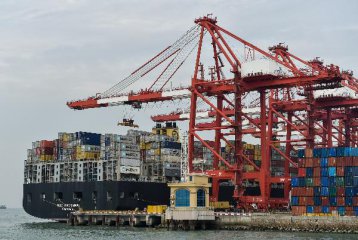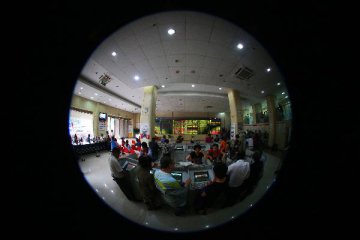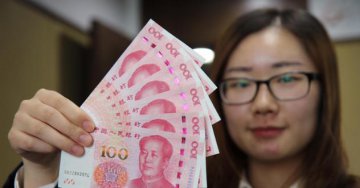Asia's biggest economy has been accelerating the opening up of its financial sector, said Mark Leung, CEO of J.P. Morgan Chase's China business
Leung said it would be a concern for investors if China were to respond to the U.S. trade war in either of two ways: weakening the yuan, or selling off U.S. Treasury holdings.
The recent selloff in emerging markets has been overblown, and there are opportunities now for investors, according to the chief executive of J.P. Morgan Chase's China business.
Mark Leung, who spoke to CNBC at the World Economic Forum on Wednesday, said that investors should consider China, in particular.
"We think the sell-off has been overdone, and if you look at the positioning and also the fundamentals side, we think there are reasons to start going into emerging markets for the medium and long term. China is a big piece."
In the past few weeks, economic troubles have hit Turkey and Argentina, leading to a selloff in emerging currencies including in Asia. Some emerging-market stock indexes have also seen steep declines.
Asia's biggest economy has been accelerating the opening of its financial sector, Leung said, with key developments such as setting up a Shanghai-London stock exchange trading link, and a new settlement system for the bond investment scheme connecting the mainland to Hong Kong.
A more open financial sector?
Beijing has claimed it wants to open its financial sector to more foreign investment by the end of 2018 and will allow foreign firms to compete on an equal footing with domestic firms in the sector. China has a long history of protecting its home-grown industries and tightly limiting foreign ownership of domestic firms.
Leung said that in the first half of this year, China has seen $43 billion of inflows from foreign investors, thanks partly to the inclusion of China A shares — stocks of mainland companies that trade on the Shanghai and Shenzhen exchanges — in global and regional indexes by index giant MSCI.
Among risks for investors, Leung said it would be a concern if China were to respond to the U.S. trade war in either of two ways: weakening the yuan or selling off its U.S. Treasury holdings.
"The concern here is actually uncertainty, so I think for investors globally, especially in (China), when you look at the stock market with so much retail participation, it's most important ... for the country to instill stability and confidence," he said.
"So I do not believe a drastic, volatile environment is good for China," he said. "So we hope to see more supportive measures from the government from a fiscal standpoint."
Leung said Chinese liberalization of the financial sector is a "critical element" of J.P. Morgan's growth strategy.
Source: CNBC
Translated by Jennifer Lu
Leung said it would be a concern for investors if China were to respond to the U.S. trade war in either of two ways: weakening the yuan, or selling off U.S. Treasury holdings.
The recent selloff in emerging markets has been overblown, and there are opportunities now for investors, according to the chief executive of J.P. Morgan Chase's China business.
Mark Leung, who spoke to CNBC at the World Economic Forum on Wednesday, said that investors should consider China, in particular.
"We think the sell-off has been overdone, and if you look at the positioning and also the fundamentals side, we think there are reasons to start going into emerging markets for the medium and long term. China is a big piece."
In the past few weeks, economic troubles have hit Turkey and Argentina, leading to a selloff in emerging currencies including in Asia. Some emerging-market stock indexes have also seen steep declines.
Asia's biggest economy has been accelerating the opening of its financial sector, Leung said, with key developments such as setting up a Shanghai-London stock exchange trading link, and a new settlement system for the bond investment scheme connecting the mainland to Hong Kong.
A more open financial sector?
Beijing has claimed it wants to open its financial sector to more foreign investment by the end of 2018 and will allow foreign firms to compete on an equal footing with domestic firms in the sector. China has a long history of protecting its home-grown industries and tightly limiting foreign ownership of domestic firms.
Leung said that in the first half of this year, China has seen $43 billion of inflows from foreign investors, thanks partly to the inclusion of China A shares — stocks of mainland companies that trade on the Shanghai and Shenzhen exchanges — in global and regional indexes by index giant MSCI.
Among risks for investors, Leung said it would be a concern if China were to respond to the U.S. trade war in either of two ways: weakening the yuan or selling off its U.S. Treasury holdings.
"The concern here is actually uncertainty, so I think for investors globally, especially in (China), when you look at the stock market with so much retail participation, it's most important ... for the country to instill stability and confidence," he said.
"So I do not believe a drastic, volatile environment is good for China," he said. "So we hope to see more supportive measures from the government from a fiscal standpoint."
Leung said Chinese liberalization of the financial sector is a "critical element" of J.P. Morgan's growth strategy.
Source: CNBC
Translated by Jennifer Lu
























Latest comments